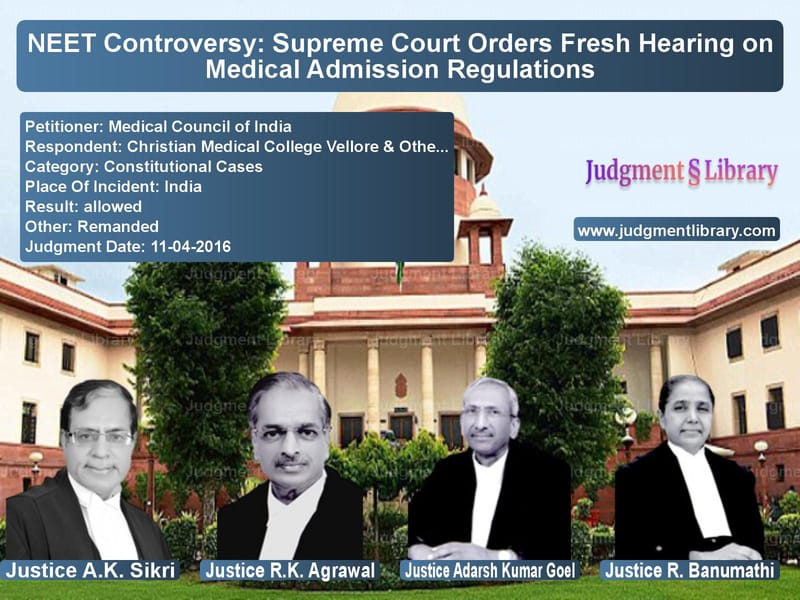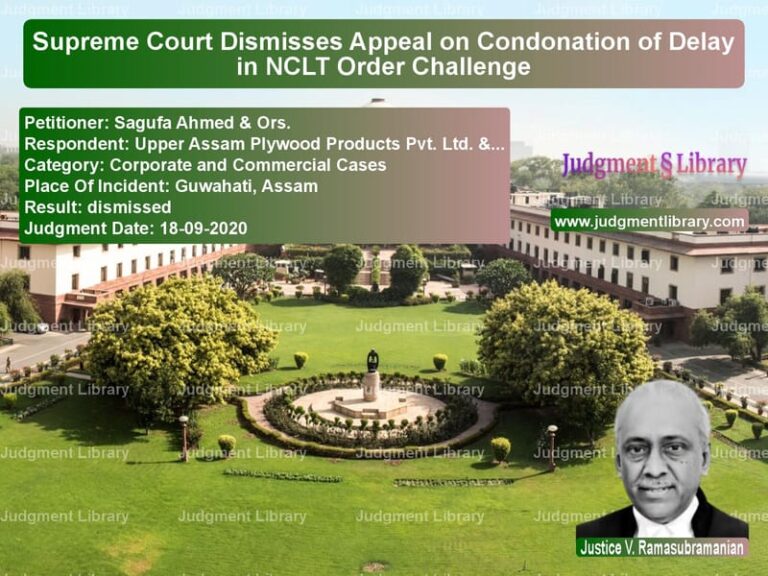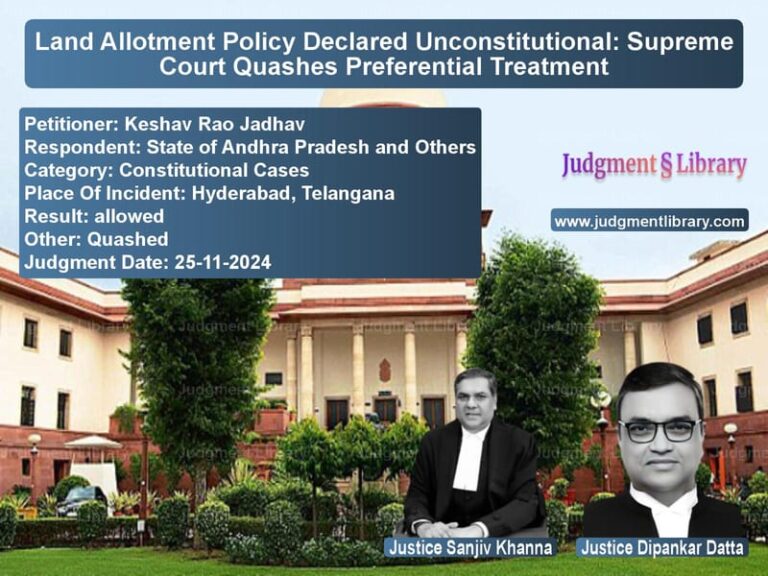NEET Controversy: Supreme Court Orders Fresh Hearing on Medical Admission Regulations
The Supreme Court of India recently revisited its controversial 2013 judgment regarding the National Eligibility-cum-Entrance Test (NEET) for medical admissions in the case of Medical Council of India v. Christian Medical College Vellore & Others. This case has significant implications for medical education, regulatory authority, and institutional autonomy in India.
Background of the Case
NEET was introduced as a centralized medical entrance test to ensure a uniform and transparent admission process across India. It aimed to eliminate irregularities, prevent capitation fees, and standardize medical admissions. However, several private institutions, including Christian Medical College (CMC), Vellore, challenged NEET, arguing that it violated their constitutional rights to manage their own admissions.
In a controversial ruling on July 18, 2013, a three-judge bench of the Supreme Court quashed NEET, ruling that it infringed upon the rights of private and minority institutions. This decision led to widespread debate, prompting the Medical Council of India (MCI) and the Union of India to seek a review, arguing that the judgment overlooked crucial legal precedents and national policy considerations.
Key Legal Issues
- Does NEET violate the rights of private and minority institutions to manage their admissions?
- What is the extent of MCI’s regulatory authority over medical education?
- Does the 2013 ruling align with previous Supreme Court precedents on education policy?
- How does NEET impact students, medical institutions, and public health?
Arguments by the Petitioners (Medical Council of India and Union of India)
The petitioners presented several arguments in favor of NEET and sought a review of the previous ruling:
- NEET was introduced to curb irregularities in medical admissions, including exorbitant capitation fees.
- The centralized examination ensures merit-based selection and maintains uniformity across medical institutions.
- The 2013 judgment did not consider binding precedents upholding MCI’s authority to regulate medical admissions.
- Allowing private institutions to conduct their own admissions could lead to arbitrary selection processes.
- The ruling created confusion among students and led to discrepancies in admission criteria across states.
Arguments by the Respondents (Christian Medical College and Other Private Institutions)
The respondents, primarily private medical colleges, opposed NEET on constitutional grounds:
- NEET violated the fundamental right of minority institutions to administer their own educational affairs.
- Institutions like CMC Vellore had established transparent admission procedures that aligned with their educational philosophy.
- Requiring all institutions to follow a single examination disregarded regional diversity and the unique needs of different communities.
- NEET imposed undue burdens on students from different state education boards with varying syllabi.
- The Supreme Court had previously upheld the rights of private institutions to frame their admission policies.
Supreme Court’s Review Decision
After extensive hearings, the Supreme Court concluded that the 2013 ruling required reconsideration. The Court observed:
“After giving our thoughtful and due consideration, we are of the view that the judgment delivered in Christian Medical College (supra) needs reconsideration.”
The Court cited several reasons for recalling the 2013 judgment:
- The previous ruling did not sufficiently discuss legal precedents that upheld MCI’s regulatory powers.
- There was no detailed discussion among the judges before the pronouncement of the 2013 judgment.
- The decision had led to practical difficulties in medical admissions, requiring a fresh review.
The Supreme Court’s review bench stated:
“Suffice it is to mention that the majority view has not taken into consideration some binding precedents and more particularly, we find that there was no discussion among the members of the Bench before pronouncement of the judgment.”
Given these concerns, the Court decided to recall the 2013 ruling and directed a fresh hearing on the matter.
Implications of the Judgment
The Supreme Court’s decision has significant implications for the future of medical education in India:
- It reopens the debate on whether a centralized medical entrance exam is necessary.
- It affects thousands of medical aspirants and private institutions awaiting clarity on admission procedures.
- The ruling impacts the balance between regulatory oversight and institutional autonomy.
- The case will set a precedent on how courts interpret education policies in relation to fundamental rights.
Future of Medical Admissions in India
With the matter set for a fresh hearing, several potential outcomes could shape the future of medical admissions:
- Reaffirmation of NEET: If the Court upholds NEET, it will strengthen MCI’s regulatory powers and standardize medical admissions.
- Modification of NEET: The Court may allow modifications to NEET to accommodate concerns of private institutions while retaining centralized oversight.
- Striking Down NEET Again: If the Court rules against NEET, medical admissions could revert to a decentralized system, raising concerns about uniformity and fairness.
Conclusion
The Supreme Court’s order to review its 2013 ruling highlights the complexities of regulating medical education in India. While NEET aims to bring standardization and transparency, concerns about institutional autonomy remain significant. With the matter now up for fresh deliberations, all stakeholders, including students, institutions, and policymakers, await a final verdict that will shape the future of medical education in India.
Don’t miss out on the full details! Download the complete judgment in PDF format below and gain valuable insights instantly!
Download Judgment: Medical Council of I vs Christian Medical Co Supreme Court of India Judgment Dated 11-04-2016-1741854537215.pdf
Direct Downlaod Judgment: Direct downlaod this Judgment
See all petitions in Fundamental Rights
See all petitions in Public Interest Litigation
See all petitions in Constitution Interpretation
See all petitions in Judgment by Anil R. Dave
See all petitions in Judgment by A.K. Sikri
See all petitions in Judgment by R K Agrawal
See all petitions in Judgment by Adarsh Kumar Goel
See all petitions in Judgment by R. Banumathi
See all petitions in allowed
See all petitions in Remanded
See all petitions in supreme court of India judgments April 2016
See all petitions in 2016 judgments
See all posts in Constitutional Cases Category
See all allowed petitions in Constitutional Cases Category
See all Dismissed petitions in Constitutional Cases Category
See all partially allowed petitions in Constitutional Cases Category







